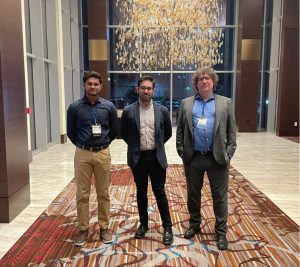News Story
KMi at ISWC 2024: Advancing the Semantic Web with Knowledge Graphs and LLMs
Monday 18 Nov 2024
Last week, Francesco Osborne, Angelo Salatino, and Tanay Aggarwal attended the 23rd International Semantic Web Conference (ISWC) in Baltimore, Maryland. Widely regarded as the premier conference in the field of the Semantic Web, ISWC is renowned for its impact and for showcasing the latest trends and advancements in the domain.
The main theme of the conference focused on integrating Knowledge Graphs and Large Language Models (LLMs), such as GraphRAG and NL2SPARQL. There has been a significant debate on whether we should opt for one solution rather than the other to solve the ongoing challenges, including a dedicated panel session. The consensus is that “LLMs will help the Semantic Web, and Semantic Web technologies are absolutely needed to make LLMs succeed”, as also mentioned by Ora Lassila, during his keynote speech.
The attendees’ overall sentiment is that after a quarter of a century, the community is finally harvesting the fruits that they have been effortlessly planting throughout the years. Of course, now, new challenges have emerged: we can finally work toward the original vision of the Semantic Web, which meant knowledge representation and agents. And LLMs can definitely help. In sum, exciting times are ahead!
This year, KMi was actively involved in several conference initiatives. Francesco served as the Industry Track Chair and organised the Job Fair. Additionally, Angelo and Francesco co-organised the 4th International Workshop on “Scientific Knowledge: Representation, Discovery, and Assessment”, which was a remarkable success. The workshop featured nine paper presentations addressing various challenges in the scholarly knowledge domain. A standout moment was the keynote speech by Natasha Noy, Research Scientist at Google Research, on the theme “Linking Scientific Knowledge: A Dataset-Centric View.” She underscored the critical importance of accurate metadata in annotating datasets and emphasised the need for community-wide incentives to achieve this goal.
Tanay presented his paper titled “Identifying Semantic Relationships Between Research Topics Using Large Language Models in a Zero-Shot Learning Setting,” co-authored with Angelo, Francesco, and Prof. Enrico Motta.
Francesco also presented a paper titled “Assessing Large Language Models for SPARQL Query Generation in Scientific Question Answering,” co-authored with Antonello Meloni, Diego Reforgiato, Angelo Salatino, Enrico Motta, Sahar Vahdati, and Jens Lehmann.
Additionally, Gregoire Burel, Harith Alani, and former PhD student Martino Mensio contributed to the paper “CimpleKG: A Continuously Updated Knowledge Graph on Misinformation, Factors and Fact-Checks,” which was presented by Raphaël Troncy (EURECOM). This paper won the prestigious Best Resource Paper Award.
We are also grateful to the National Science Foundation (NSF) and the Semantic Web Science Association (SWSA) for awarding Tanay a generous student grant of $2,800, enabling him to attend the conference and present his research paper. This support marks a significant milestone in his doctoral studies and reflects the conference’s commitment to inclusivity by providing financial assistance to foster students’ academic growth.
Looking ahead, ISWC 2025 will be held in Nara, Japan, where Angelo will serve as the Resource Track Chair. Looking forward to the next edition!
Related links:
- Conference website
- Sci-K 2024
- Identifying Semantic Relationships Between Research Topics Using Large Language Models in a Zero-Shot Learning Setting (paper)
- CimpleKG: A continuously updated knowledge graph on misinformation, factors and fact-checks (Best Resource Paper Award page)
Latest News
Connecting Ideas: FBL Visits KMi
KMi takes centre stage at landmark Milton Keynes event
KMi and Springer Nature renew their partnership for another two years
Dr. Tracie Farrell delivers keynote on the ethics of consent at OU GenAI Conference
Breaking barriers: Teresa Sides explores AI adoption in primary care

